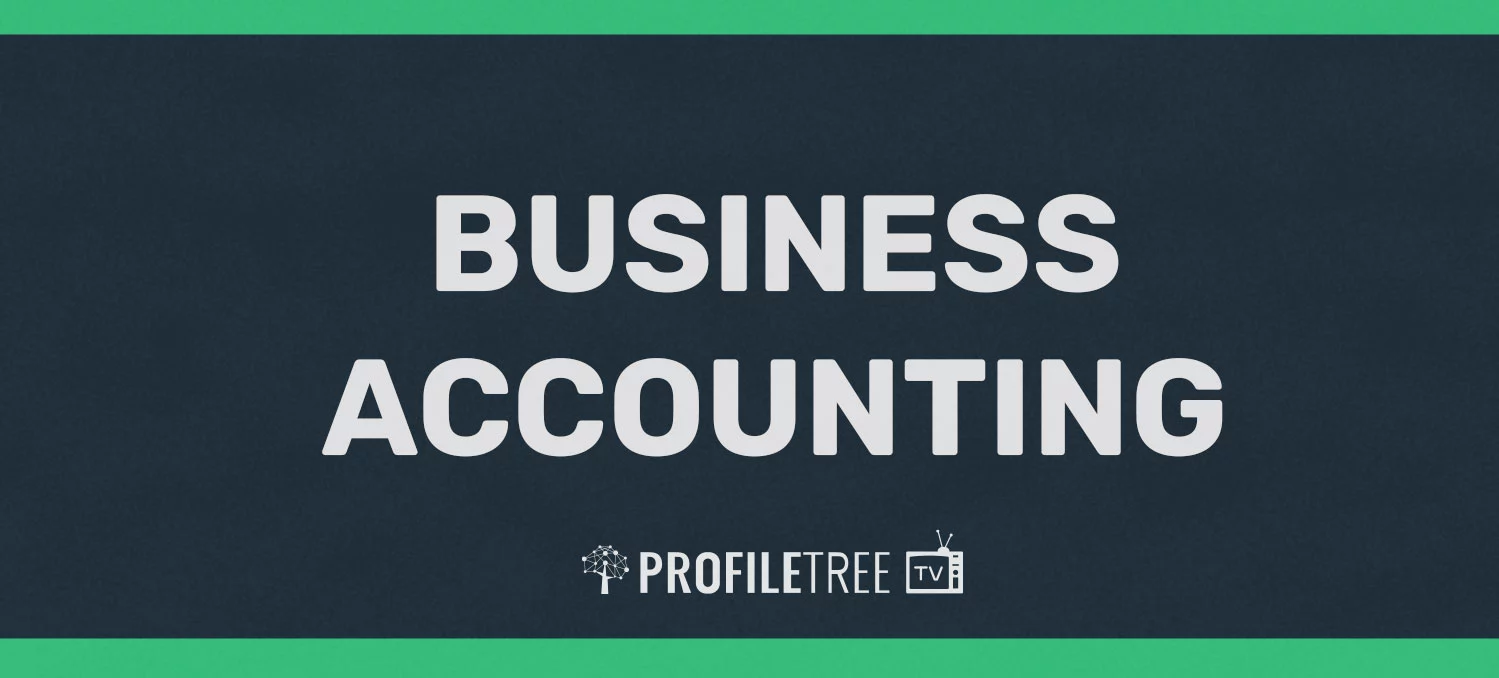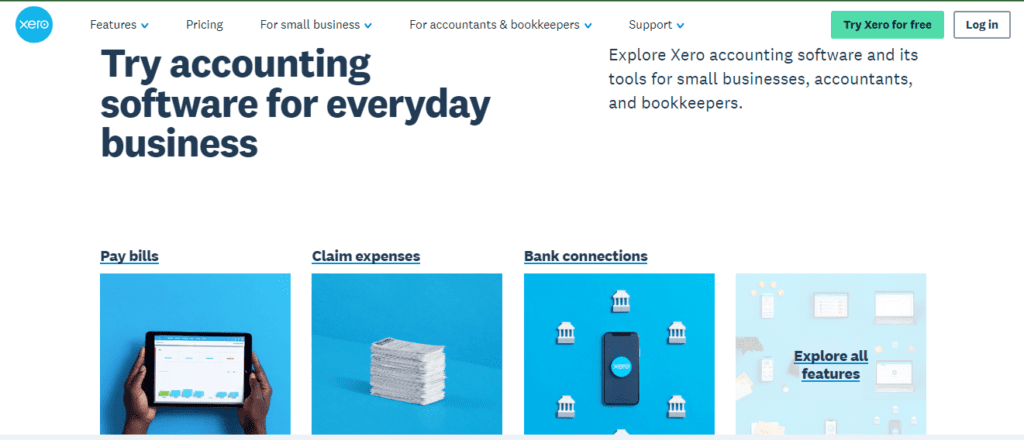How important is bookkeeping for a small business? A superb summary by a Northern Ireland-based specialist sums up just how vital bookkeeping is for companies big and small.
Marie, of New Balance Bookkeeping, pointed out that “staying on top of their accounts” can help companies to “make strong business decisions”.
Introducing the work of her own business, Marie explained that New Balance is a “small, client-focused practice”.
“We’re very very small at the moment but hoping to grow bigger and we have quite a varied client base. We deal with lots of small businesses but we have some as well which would be classed as micro-entities and slightly bigger as well.”

She answered a common question those outside the business community might ask by outlining the crucial difference between a bookkeeper and an accountant.
“Going back years ago there was quite a marked difference…I think now the gap is starting to close on the services that are offered by both accountants and bookkeepers where bookkeepers are expanding their skill sets and able to offer the likes of management reporting and income tax returns.
“It’s actually very good for us in that I’m affiliated to a professional body and they’re very good at providing that training that we need to enable us to be more competitive in the market and give our clients a more holistic approach to the services that we can offer them.
“I’m not going to say a ‘one stop shop’ because obviously there are clients who need the input from accountants as well, but from the accounting side they’re also starting to offer bookkeeping. Some of them are bringing bookkeeping in-house.
“We’re moving closer as professions and it’s nice because sometimes you can meet accountants and you can have that collaboration and between the two we can offer that full service.”
Asked about the rise of digital accounts software businesses can now use, Marie said modern business life had moved beyond “bringing your paperwork to us in a bag” and gave an insight into why this is such a positive development.
“There are so many options out there for clients that will fit the way they work.
“There aren’t two of my clients who use the same means of providing me with the information that I need to do their work. Which is obviously good from our point of view as it means that we’re providing options for clients that’ll fit with them, some clients aren’t very good with IT and we can sit with them and work through and figure out a method that works for them.”
Marie added that GDPR represented a major impact in how companies handle data.
“I think GDPR has been a big shock to a lot of people…you realise all of a sudden that this is serious. So we have all, not just my business but all businesses, had to adapt to that and I think some people are maybe not quite there.
To explore more on these subjects, and topics such as making tax digital, watch Marie’s full Business Leaders Series video.
Table of Contents
Bookkeeping 101
For those without an accounting background, let’s review some fundamental terminology and financial statements involved in small business bookkeeping.
Key Terms:
- Accounts Payable – Money your business owes to vendors/suppliers
- Accounts Receivable – Invoices owed to your business by customers
- Assets – Resources owned by your business such as cash, inventory, equipment
- Chart of Accounts – List categorizing transactions like payroll or rent
- Double Entry Method – Logging every transaction across two accounts to “balance books”
Key Financial Statements:
- Income Statement – Shows company’s revenues, expenses and net profit/loss over a period
- Balance Sheet – Snapshot of assets, liabilities and equity on a certain date
- Cash Flow Statement – Breaks down inflows and outflows of cash
Getting intimate with these accounts, ledgers, assets and financial reports is key. While intimidating at first, mastering bookkeeping basics pays dividends for small business success and growth down the road.
Bookkeeping Software Options
When managing your own books, business software can save tons of time and headache. Here are top platforms to consider with weigh-ins on features.

Pros: Very user-friendly, ideal for beginners. Robust features like invoicing, reporting, payroll. Integrates with many business apps.
Cons: Can get pricier for premium plans. Not optimized for niche industries.

Pros: Cloud-based with excellent mobility features. Strong inventory and ecommerce options. Over 700 app integrations.
Cons: Base plan light in features. Steeper learning curve than QuickBooks.

Pros: 100% free software option. Covers must-have features of payments, billing, payroll. Ideal for solopreneurs.
Cons: Lack of live support. Limited reporting functionality.
Pros: Streamlined invoices with automatic payment reminders. Seamless tax preparation capabilities.
Cons: No video tutorials for onboarding. Prices rise steeply for added features.
When selecting the ideal bookkeeping platform, evaluate your business’s size, budget, feature needs and in-house vs outsourced preferences. Leverage free trials to test-drive top contenders.
Step-by-step guidelines for some basic small business bookkeeping tasks:
Invoicing Clients
- Create invoice template in software or Excel with business logo, details, table for line items
- For each new invoice, include invoice number, client details, description of work, payment timeline
- Input amounts for fees, itemized expenses if any, taxes, preferred payment method info
- Review for accuracy then email invoice to client directly from accounting software
Recording Expenses
- Gather invoice/receipt from purchases whether for office supplies, contractors, software, rent
- Match expense to appropriate Expense account like Advertising, Contract Labor, etc.
- Enter dollar amount of expense, date paid, payment reference details if paying bill
- Attach copy of receipt as evidence to the expense record.
For businesses looking to further streamline the management of financial documents, DocuClipper offers a powerful solution to easily digitize receipts and invoices. This can simplify the recording of expenses by reducing manual data entry and improving the accuracy of your financial records.
Bank Reconciliations
- Download latest bank transaction report that matches with your record-keeping cut-off date
- Compare individual transactions from bank against income/expenses on books
- Investigate any discrepancies in amounts or missing transactions on either side
- Make adjustments for outstanding deposits/checks not cleared to calculate true balances
Interviews with two small business owners on their biggest bookkeeping challenges and how they overcame them:
John, eCommerce Company Founder: “Not separating my personal and business finances early on created lots of issues later for understanding the true profitability of my company. I finally set up a legal entity and business bank account. Using accounting software with dashboards for both has been a game changer.”
Mary, Marketing Consultant: “Time and organization are always challenges as a solopreneur. I felt overwhelmed managing invoices, expenses, tax paperwork on endless spreadsheets. Hiring a bookkeeper for a few hours a month for Tasks like accounts reconciliation and client billing gives me time to focus on revenue-generating projects.”
Key Takeaways:
- Segregate personal and business accounts from Day 1
- Leverage technology dashboards for visibility
- Outsource select bookkeeping Tasks based on bandwidth and strengths
Interviewing fellow founders offers authentic perspectives on pain points new entrepreneurs will likely relate to. Their lessons learned can inspire effective methods for managing finances and compliance.
Real-Life Examples and Case Studies for “Bookkeeping for Small Businesses”
1. The Case of the Flourishing Florist:
Sarah, a passionate florist, started her business with a dream and a shoestring budget. Initially, she managed her finances manually, but soon found herself overwhelmed by piles of receipts and conflicting numbers. This led to missed deadlines, inaccurate tax filings, and ultimately, financial stress.
After implementing a simple bookkeeping system and utilizing cloud-based accounting software, Sarah was able to:
- Track income and expenses accurately.
- Identify areas where she could save money.
- Make informed decisions about her business growth.
- Gain peace of mind and focus on her passion: creating beautiful floral arrangements.
2. The Lesson of the Lost Leather Goods:
Mark, a talented leather crafter, built a successful online store selling handcrafted wallets and belts. However, due to poor record-keeping, he struggled to track his inventory levels. This resulted in overstocking of unpopular items and understocking of bestsellers, leading to missed sales opportunities and disgruntled customers.
By adopting a barcode scanning system and regularly reconciling inventory with his bookkeeping records, Mark was able to:
- Maintain optimal inventory levels.
- Reduce waste and overstock.
- Increase customer satisfaction by ensuring timely delivery of desired products.
- Gain valuable insights into product performance and customer preferences.
3. The Story of the Savvy Salon:
Anna, a dedicated hairstylist, opened her own salon with the ambition of providing exceptional service to her clients. However, she lacked experience with financial management and soon found herself facing financial difficulties.
By engaging a bookkeeping service, Anna was able to:
- Free up valuable time to focus on serving clients and growing her business.
- Receive expert advice on tax planning and financial strategies.
- Obtain accurate financial reports for better decision-making.
- Achieve financial stability and secure her salon’s long-term success.
4. The Case of the Thriving Tech Startup:
David and his team of tech whizzes launched a revolutionary mobile app. However, they were initially unsure of the best approach to manage their finances. After researching and comparing different options, they chose an online bookkeeping platform tailored for startups.
This decision helped them to:
- Simplify and automate routine bookkeeping tasks.
- Collaborate efficiently with their accountant and investors.
- Gain real-time insights into their financial performance.
- Make data-driven decisions to fuel rapid business growth.
5. The Power of Cloud-Based Bookkeeping:
Maria, a busy entrepreneur juggling multiple businesses, realized the inefficiency of her traditional paper-based bookkeeping system. She switched to a cloud-based solution, which offered her:
- Accessibility from any device, at any time.
- Automatic data backup and security.
- Enhanced collaboration with colleagues and financial advisors.
- Integration with other business tools and applications.
- A streamlined and paperless workflow.
These examples illustrate the diverse challenges and opportunities faced by small businesses regarding bookkeeping. By learning from these real-life scenarios, readers can gain valuable insights and practical strategies to ensure their own financial success.
Common Bookkeeping Mistakes and How to Avoid Them
Effective bookkeeping is crucial for the success of any small business. However, even the most diligent business owners can fall prey to common mistakes. Let’s explore some of the most prevalent issues and how to avoid them:
1. Not Reconciling Accounts Regularly:
- Mistake: Failing to reconcile bank statements with your bookkeeping records can lead to discrepancies, inaccurate financial reports, and missed errors.
- Solution: Develop a consistent schedule for reconciling your accounts, aiming for at least monthly reconciliation. Utilize technology like online banking and accounting software for faster and more efficient reconciliation.
2. Mixing Personal and Business Finances:
- Mistake: Using your personal accounts for business transactions can blur the lines, complicate tax filing, and make it difficult to track business expenses.
- Solution: Establish separate bank accounts and credit cards for your business. This will simplify bookkeeping, enhance financial clarity, and protect your personal finances.
3. Disregarding Receipt Management:
- Mistake: Ignoring or neglecting to organize and store receipts can lead to lost documentation, missed tax deductions, and difficulties during audits.
- Solution: Implement a system for collecting and storing receipts, either physical or digital. Utilize apps or software designed for receipt management to simplify the process and ensure easy retrieval.
4. Ignoring Inventory Tracking:
- Mistake: Not tracking inventory levels accurately can result in overstocking, understocking, and missed sales opportunities.
- Solution: Implement an inventory management system, such as barcodes or inventory management software. Regularly conduct physical inventory counts and reconcile them with your records.
5. Not Categorizing Transactions Properly:
- Mistake: Inaccurate categorization of transactions can lead to misleading financial reports and difficulty understanding your business’s financial performance.
- Solution: Create a consistent and detailed chart of accounts to categorize all transactions accurately. Use descriptive titles for entries and ensure consistency throughout your bookkeeping records.
6. Delaying Bookkeeping Tasks:
- Mistake: Procrastinating on bookkeeping tasks can create a backlog of work, leading to stress, missed deadlines, and potential financial penalties.
- Solution: Develop a regular schedule for bookkeeping and dedicate specific time slots for data entry, reconciliation, and financial reporting. Consider automating repetitive tasks using technology whenever possible.
7. Neglecting Backup and Security:
- Mistake: Failing to back up your bookkeeping data regularly puts your information at risk in the event of hardware failure, software glitches, or cyberattacks.
- Solution: Implement a robust backup system, including both local and cloud storage options. Regularly test your backups to ensure they are functional and complete. Invest in cybersecurity measures like strong passwords and antivirus software.
8. Not Seeking Professional Help:
- Mistake: Trying to manage complex bookkeeping tasks without the necessary expertise can lead to errors, inefficient processes, and missed opportunities to optimize your finances.
- Solution: Consider seeking professional help from a bookkeeper or accountant who can provide expert guidance, handle complex tasks, and ensure compliance with tax regulations.
By understanding these common mistakes and implementing preventive solutions, small business owners can significantly improve their bookkeeping practices, gain better control over their finances, and make informed decisions for sustainable business growth.
More Business Leader Interviews from ProfileTree TV
Business Interviews:
Two Years to £27 Million | Should Your Business be Concerned about Brexit? | The Business Mindset | Workplace Wellness | What is Company Culture? | Business Broadband NI | How to do Business Internationally? | Do you have a HR Strategy? | What is Innovation? | What is a Business Development Manager? | Importance of HR | Accounting Strategy
Different Business Types:
What is a Franchise Business? | FitzWilliam Hotel Belfast | Newspaper Marketing Trends | Discussing Product Development
Personal Development:
The ‘PROVE IT’ Guy | Performance Consultant and Speaker | How to Build Self-Confidence | What is NLP Therapy? | Feel Good Hypnosis
Marketing:
How to use Psychology Marketing? | What is Growth Hacking? | Using Foreign Investment (FDI) in Marketing
Technology:
Augmented Reality in Education | Why is Technology Important in Business?
Other:
How to Generate Energy from Waste
FAQs
Still have questions? Check out common bookkeeping concerns below.
Q: Should I use Excel or accounting software?
A: Start with spreadsheets for simplicity, but transition to more robust software as soon as viable.
Q: What qualifications must a bookkeeper have?
A: No formal credentials required but pursue certified programs to stand out. Focus on accuracy, timeliness and communication abilities.
Q: How often should I reconcile accounts?
A: Reconcile all transactional accounts like cash, credit cards, bank at least monthly.
Q: What records must I keep for taxes?
A: Keep support for all incomes and expenses for minimum 6 years. Consult an accountant on requirements.
Q: When should I hire a professional?
A: If facing compliance errors, needing audited financials for investors, or lacking time for higher value work.
Conclusion
Learning bookkeeping basics empowers entrepreneurs to better understand their company’s financial health. While outsourcing remains an option, getting hands-on with bank reconciliations, expense tracking and other critical Tasks builds financial literacy to drive informed business decisions. Utilize the templates, software options and workflows outlined here to establish a scalable bookkeeping foundation. Feel confident in tackling the numbers through dedicating a consistent time allowance, leveraging the right tools and applying lessons from fellow founders.


